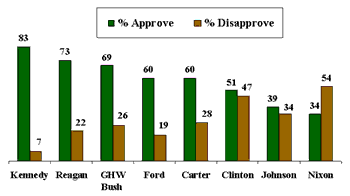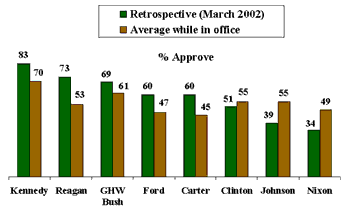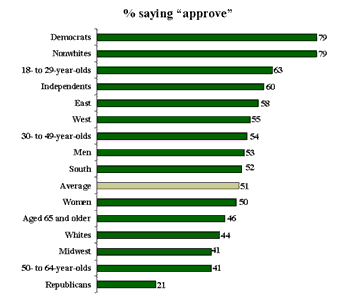GALLUP NEWS SERVICE
PRINCETON, NJ -- John F. Kennedy continues to have the highest retrospective job-approval rating of any of the last eight presidents, followed by Ronald Reagan, George H.W. Bush, Gerald Ford and Jimmy Carter. Richard Nixon and Lyndon Johnson have the lowest retrospective approval ratings. Bill Clinton -- measured for the first time since leaving office -- ranks only sixth. Clinton's retrospective approval rating is slightly lower than his overall average while he was in office, and considerably lower than his average over his second term, between 1997 and 2001.
These ratings are based on a question that asks Americans to indicate whether -- in retrospect -- they approve or disapprove of the way a president handled his job while he was in office.
| Retrospective Job Approval Ratings: March 2002 |
 |
| March 18-20, 2002 |
The spread in these ratings is quite wide, as can be seen. More than eight out of 10 Americans say they approve of the way John F. Kennedy handled the presidency, while at the other end of the spectrum, only about a third say they approve of how the office was handled by Richard Nixon.
We can classify the last eight presidents into categories based on how the public sees them now:
|
HOW PRESIDENTS ARE SEEN NOW |
|
|
Number One |
Average |
|
John F. Kennedy |
Bill Clinton |
|
Highly Regarded |
Below Average |
|
Ronald Reagan |
Lyndon Johnson |
|
George H. W. Bush |
Richard Nixon |
|
Above Average |
|
|
Gerald Ford |
|
|
Jimmy Carter |
|
In most cases, these retrospective ratings differ substantially from the actual ratings the presidents received while they were in office. The retrospective ratings can be quite significant, as they provide a window into the way in which the passage of time and the impact of revisionist history are shaping the long-term reputations of the presidents. Most students of history know that presidents who are now regarded quite highly -- such as Abraham Lincoln -- may not have been nearly as popular while they were in office.
| Retrospective Job Approval Rating Vs. Actual Averages While in Office |
 |
Five of the last eight presidents now have more positive approval ratings than they did while in office.
The biggest increase occurs with Ronald Reagan, who was in office between 1981 and 1989. Reagan's average job-approval rating while in office -- 53% -- was only mid-range. (Reagan averaged 50% in his first term and 55% in his second term.) Now, looking back, a resounding 73% of Americans say they approve of how he handled his job while president -- a 20 percentage-point jump.
Two other presidents who did not do particularly well in terms of approval ratings while in office have seen a significant rise in their ratings over time. Jimmy Carter averaged only 45% while in office, but looking back, 60% of Americans now say they approve of how he handled his job. Similarly, Gerald Ford averaged only 47% during his brief tenure in office, between August 1974 and January 1977, but he now gets a 60% retrospective approval rating.
John Kennedy represents a slightly different situation. Kennedy already had the highest average job-approval rating of any president Gallup has measured (going back to Franklin D. Roosevelt), at 70%. But the passage of time has been even more kind to Kennedy, and in retrospect, an extraordinary 83% of Americans say they approve of how he handled his 1,000 days in office, between January 1961 and November 1963.
Bush the elder's average while in office is the second highest of any of these last eight presidents -- 61% -- despite the fact that his ratings were on a downslide in his last year and he lost his bid for re-election to Bill Clinton in 1992. Now, in retrospect, Bush gets a 69% approval rating.
The biggest downturns in public opinion have occurred in the retrospective job-approval ratings for Lyndon Johnson and Richard Nixon. Both men did well in their first terms in office -- Johnson getting an extraordinary 74% average from the time when he took office following JFK's assassination in November 1963 to his inauguration for a second term in January 1965. Nixon averaged 56% in his first term and was overwhelmingly re-elected in 1972 over Democratic candidate George McGovern.
But both men saw their approval ratings plummet. Johnson fell victim to national discontent over his Vietnam policies, and by the time he left office in January 1969, his overall average across all of his time in office had fallen to just 55%. (Johnson averaged only 42% for his last year in office.) It is apparent that this more negative side of his presidency is what is remembered now; Johnson gets only a 39% retrospective approval rating, a drop of 16 percentage points from his term average, and about the same as he received in his last year.
Richard Nixon's ratings fell to only a 34% average in the year and a half of his second term, before he resigned in August 1974 because of the escalating Watergate scandal. His overall rating for his entire term in office was only 49%. Despite Nixon''s efforts to restore his reputation in the years between 1969 and his death in 1994, only 34% of Americans now, in retrospect, say they approve of how he handled his job, while 54% say they disapprove. (This 34% is, however, higher than the extremely low 25% average Nixon received in his last eight months in office in 1974.)
This brings us to Bill Clinton. Clinton averaged a 55% job-approval rating over his eight years in office between January 1993 and January 2001. Although it would be easy to assume that Clinton''s ratings were worst in his last years in office -- as he became embroiled in the Monica Lewinsky scandal and became only the second president in U.S. history to be impeached by the House of Representatives -- the reverse is true. His second-term job-approval average was actually quite a bit higher than that of his first term. He averaged only 50% in his first term -- beset in large part by the woes of the economy. Bolstered by a robust economy in his second term, Clinton averaged 61% from 1997-2001. Clinton''s overall average of 55% is slightly above the averages of Presidents Reagan, Carter, Ford, and Nixon, and is tied with Johnson''s.
There is a great deal of interest in how history is going to view Bill Clinton. Will he be judged more on the years of prosperity and relative international peace that occurred during his term, or will his personal failings, the impeachment and other scandals dominate his legacy? Our first indication from the public does little to suggest that Clinton's image has become more positive in the 14 months since he left office. Just 51% of Americans now say they approve of the job Clinton did while in office, and a substantial 47% say they disapprove (the second-highest disapproval rating, behind only Nixon''s). This marks a drop from the higher ratings he was receiving as he left office, and a slight drop even from his overall two-term average.
Who remembers Clinton most fondly? The divisions in this retrospective approval are very similar to those found while he was in office. Democrats and nonwhites are his strongest supporters, as are younger Americans. The groups least likely to say they approve are -- not surprisingly -- Republicans, those living in the Midwest, older Americans and whites.
| Retrospective Approval: Bill Clinton |
 |
| March 18-20, 2002 |
Survey Methods
These results are based on telephone interviews with a randomly selected national sample of 1,009 adults, 18 years and older, conducted March 18-20, 2002. For results based on this sample, one can say with 95 percent confidence that the maximum error attributable to sampling and other random effects is plus or minus 3 percentage points. In addition to sampling error, question wording and practical difficulties in conducting surveys can introduce error or bias into the findings of public opinion polls.
From what you have heard, read, or remember about some of our past presidents, please tell me if you approve or disapprove of the way each of the following handled their job as president. How about... [RANDOM ORDER]
Bill Clinton
|
Approve |
Disapprove |
No opinion |
|
|
% |
% |
% |
|
|
2002 Mar 18-20 |
51 |
47 |
2 |
The elder George Bush
|
Approve |
Disapprove |
No opinion |
||
|
% |
% |
% |
||
|
2002 Mar 18-20 |
69 |
26 |
5 |
|
|
2000 Feb 14-15 ^ |
74 |
23 |
3 |
|
|
1999 Feb 8-9 ^ |
76 |
22 |
2 |
|
|
1993 Nov 15-16 ^ |
58 |
40 |
2 |
|
|
^ |
WORDING: George Bush |
|||
Ronald Reagan
|
Approve |
Disapprove |
No opinion |
|
|
% |
% |
% |
|
|
2002 Mar 18-20 |
73 |
22 |
5 |
|
2000 Feb 14-15 |
66 |
32 |
2 |
|
1999 Feb 8-9 |
71 |
27 |
2 |
|
1993 Nov 15-16 |
52 |
45 |
3 |
|
1992 Jun 4-8 |
50 |
47 |
3 |
|
1990 Nov 8-11 |
54 |
44 |
2 |
Jimmy Carter
|
Approve |
Disapprove |
No opinion |
|
|
% |
% |
% |
|
|
2002 Mar 18-20 |
60 |
28 |
12 |
|
2000 Feb 14-15 |
64 |
31 |
5 |
|
1999 Feb 8-9 |
69 |
27 |
4 |
|
1993 Nov 15-16 |
45 |
50 |
5 |
|
1992 Jun 4-8 |
48 |
46 |
6 |
|
1990 Nov 8-11 |
45 |
52 |
3 |
Gerald Ford
|
Approve |
Disapprove |
No opinion |
|
|
% |
% |
% |
|
|
2002 Mar 18-20 |
60 |
19 |
21 |
|
2000 Feb 14-15 |
66 |
25 |
9 |
|
19899 Feb 8-9 |
71 |
22 |
7 |
|
1993 Nov 15-16 |
50 |
33 |
17 |
|
1992 Jun 4-8 |
56 |
29 |
15 |
|
1990 Nov 8-11 |
55 |
34 |
11 |
Richard Nixon
|
Approve |
Disapprove |
No opinion |
|
|
% |
% |
% |
|
|
2002 Mar 18-20 |
34 |
54 |
12 |
|
2000 Feb 14-15 |
31 |
65 |
4 |
|
1999 Feb 8-9 |
34 |
63 |
3 |
|
1993 Nov 15-16 |
37 |
56 |
7 |
|
1992 Jun 4-8 |
35 |
59 |
6 |
|
1990 Nov 8-11 |
32 |
62 |
6 |
Lyndon Johnson
|
Approve |
Disapprove |
No opinion |
|
|
% |
% |
% |
|
|
2002 Mar 18-20 |
39 |
34 |
27 |
|
2000 Feb 14-15 |
48 |
39 |
13 |
|
1999 Feb 8-9 |
45 |
45 |
10 |
|
1993 Nov 15-16 |
35 |
43 |
22 |
|
1992 Jun 4-8 |
35 |
45 |
20 |
|
1990 Nov 8-11 |
40 |
43 |
17 |
John F. Kennedy
|
Approve |
Disapprove |
No opinion |
|
|
% |
% |
% |
|
|
2002 Mar 18-20 |
83 |
7 |
10 |
|
2000 Feb 14-15 |
86 |
10 |
4 |
|
1999 Feb 8-9 |
85 |
13 |
2 |
|
1993 Nov 15-16 |
78 |
13 |
9 |
|
1992 Jun 4-8 |
76 |
14 |
10 |
|
1990 Nov 8-11 |
84 |
9 |
7 |
SUMMARY TABLE: RETROSPECTIVE PRESIDENTIAL JOB APPROVAL
|
2002 Mar 18-20 |
Approve |
Disapprove |
|
% |
% |
|
|
John F. Kennedy |
83 |
7 |
|
Ronald Reagan |
73 |
22 |
|
The elder George Bush |
69 |
26 |
|
Gerald Ford |
60 |
19 |
|
Jimmy Carter |
60 |
28 |
|
Bill Clinton |
51 |
47 |
|
Lyndon Johnson |
39 |
34 |
|
Richard Nixon |
34 |
54 |
